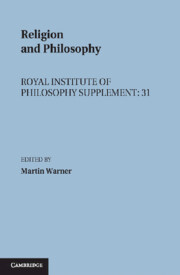The Meaning of ‘God’
Published online by Cambridge University Press: 04 August 2010
Summary
Introduction
In this paper I shall be examining the following claims:
(1) that ‘God’ has no meaning, in the sense of ‘sense’; that it is a proper name analogous to a Russellian proper name in that it has reference only. More crudely, that we cannot describe God in any way but only name Him and refer to Him by name;
(2) that ‘God’ has no meaning, in the sense of ‘sense’ in that the nature of God is fundamentally inexpressible. That God is, as some have said, ‘wholly other’ or even ‘the wholly other’.
Having contended that neither (1) nor (2) are plausible, I shall then raise the question of what it is to offer an account of the meaning of a word. For present purposes I put forward a Wittgensteinian account in terms of ‘use’ mentioning various uses of the term ‘God’ in Christian activity. I then ask whether the uses mentioned rest upon a more basic use or meaning. I shall hold that they do so rest upon a more basic use or meaning—a ‘descriptive’ use or meaning.
I then turn to the problem that ‘God’ in Christian Theology appears to have no single descriptive use or meaning but rather a variety of such uses or meanings some of which seem incompatible with one another in more or less radical ways.
- Type
- Chapter
- Information
- Religion and Philosophy , pp. 71 - 90Publisher: Cambridge University PressPrint publication year: 1992
- 1
- Cited by

